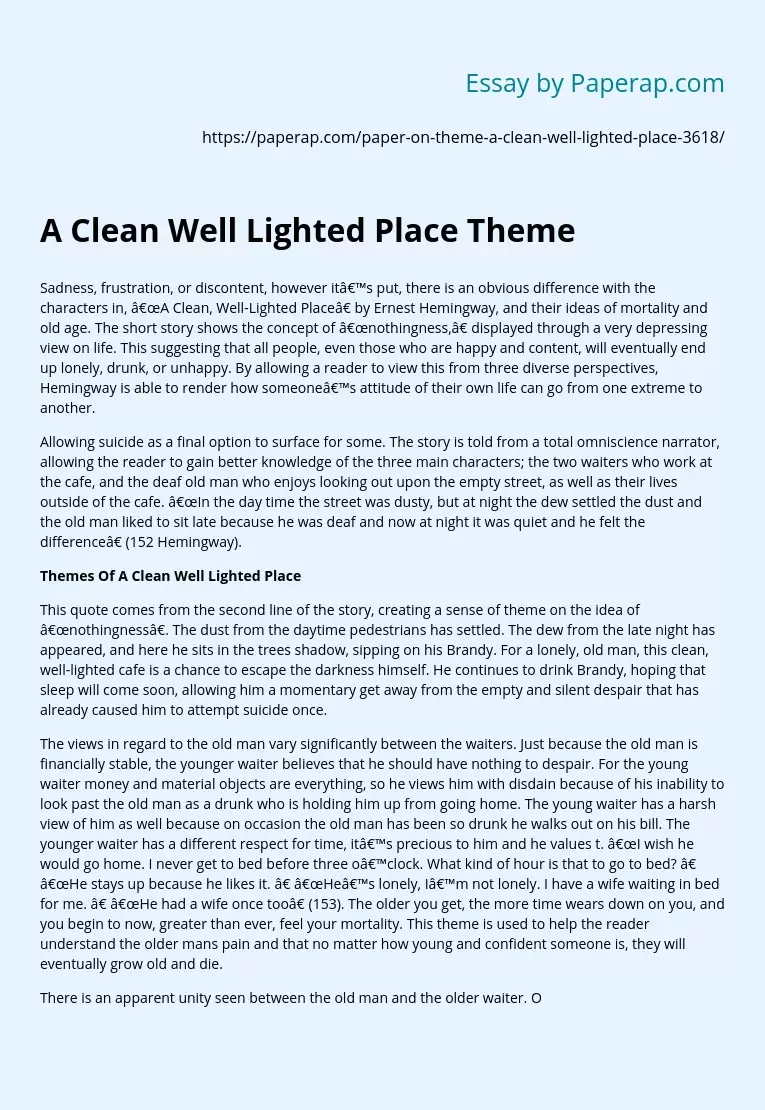A Clean Well Lighted Place Theme
Sadness, frustration, or discontent, however it’s put, there is an obvious difference with the characters in, “A Clean, Well-Lighted Place” by Ernest Hemingway, and their ideas of mortality and old age. The short story shows the concept of “nothingness,” displayed through a very depressing view on life. This suggesting that all people, even those who are happy and content, will eventually end up lonely, drunk, or unhappy. By allowing a reader to view this from three diverse perspectives, Hemingway is able to render how someone’s attitude of their own life can go from one extreme to another.
Allowing suicide as a final option to surface for some. The story is told from a total omniscience narrator, allowing the reader to gain better knowledge of the three main characters; the two waiters who work at the cafe, and the deaf old man who enjoys looking out upon the empty street, as well as their lives outside of the cafe. “In the day time the street was dusty, but at night the dew settled the dust and the old man liked to sit late because he was deaf and now at night it was quiet and he felt the difference” (152 Hemingway).
Themes Of A Clean Well Lighted Place
This quote comes from the second line of the story, creating a sense of theme on the idea of “nothingness”. The dust from the daytime pedestrians has settled. The dew from the late night has appeared, and here he sits in the trees shadow, sipping on his Brandy.
For a lonely, old man, this clean, well-lighted cafe is a chance to escape the darkness himself. He continues to drink Brandy, hoping that sleep will come soon, allowing him a momentary get away from the empty and silent despair that has already caused him to attempt suicide once.
The views in regard to the old man vary significantly between the waiters. Just because the old man is financially stable, the younger waiter believes that he should have nothing to despair. For the young waiter money and material objects are everything, so he views him with disdain because of his inability to look past the old man as a drunk who is holding him up from going home. The young waiter has a harsh view of him as well because on occasion the old man has been so drunk he walks out on his bill. The younger waiter has a different respect for time, it’s precious to him and he values t. “I wish he would go home. I never get to bed before three o’clock. What kind of hour is that to go to bed? ” “He stays up because he likes it. ” “He’s lonely, I’m not lonely. I have a wife waiting in bed for me. ” “He had a wife once too” (153). The older you get, the more time wears down on you, and you begin to now, greater than ever, feel your mortality. This theme is used to help the reader understand the older mans pain and that no matter how young and confident someone is, they will eventually grow old and die.
There is an apparent unity seen between the old man and the older waiter. Opposite from the young waiter, the older waiter and old man seem devastatingly lonely and worn out by life. While the young waiter is rude and insistently talks down to the old man, the older waiter defends him. He too understands and appreciates a clean, well-lighted cafe opposed to a bar or bodega. The older men understand each other without there being any communication between them. In the final line the reader is able to truly understand the older waiters view of his own morality, “He disliked bars and bodegas.
A clean, well-lighted cafe was a very different thing. Now, without thinking further, he went home to his room. He would lie in the bed and finally, with daylight, he would go to sleep. After all, he said to himself, it is probably only insomnia. Many must have it” (155). The two older gentlemen have found a way of coping with their morality and old age, as well as the idea of “nothingness” that is a result of life’s hardships. Both cope in a very dignified, and graceful manners.
Even though the old man is drunk, he is never disrespectful or disorderly, but yet polite and well mannered. Both show signs of previous hardships, the older waiter tries to explain he once had a wife, and the old man attempted suicide. Yet, neither of them ever lose their tempers, but instead stay calm and collected. Hemingway, Earnest. “A Clean, Well-Lighted Place”. Literature: An Introduction to Fiction, Poetry, Drama, and Writing. Ed. X. J. Kennedy and Dana Gioia. 11th ed. New York: Pearson Longman, 2010. 152-155.
A Clean Well Lighted Place Theme. (2019, Dec 05). Retrieved from https://paperap.com/paper-on-theme-a-clean-well-lighted-place-3618/

